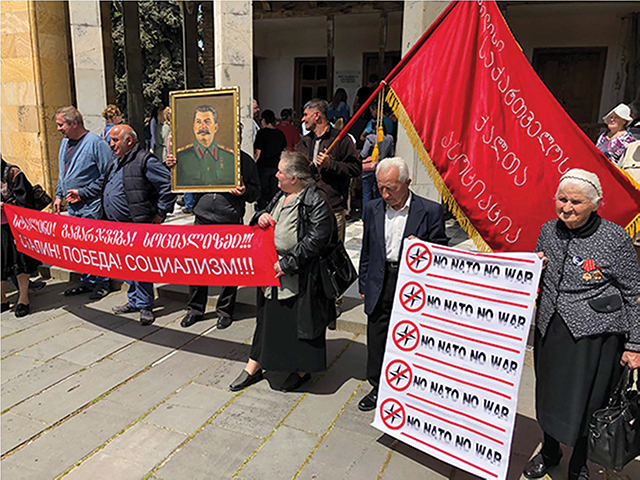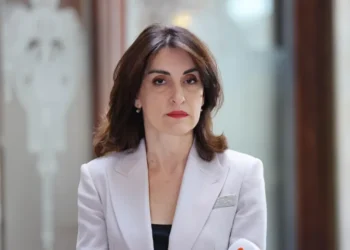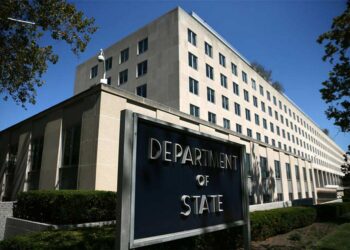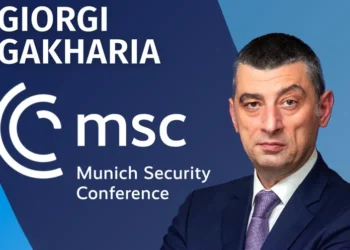While the lyrics of the 1968 Beatles classic were only a parody of other contemporary pieces, it may have some notes of truth in today’s Georgia. European Union flags, “move to Europe” stickers, and growing socio-economic connections to the EU make the country more Western than any of the regional neighbors. Despite this, there have been a number of actions by both the citizens and the government that may bring into question the direction the country is aimed.
The country’s relationship with its northern neighbor has long been fraught. Since Kremlin troops assisted in ousting ethnic Georgians from their land in the early 1990s, invaded in 2008, and have facilitated crimes against Georgians ever since, they have failed to improve. With the recent invasion of Ukraine, Tbilisi has been hesitant to join the West in its harsh condemnations, sanctions, and military assistance programs to Ukraine.
More recently, actions taken by the government raise questions as to the loyalties of its most senior members. These actions have also sparked sharp responses from Europe’s leadership. This came to a head in June last year when European Commission President Ursula von der Leyen recommended denying Georgia a pathway into the EU, but was in favor of a pathway for Moldova and Ukraine.
‘The sooner you deliver, the sooner there is progress’, she said, addressing Tbilisi. However, rather than respond with gusto and emphasis on reform and a renewed vigor forward, leading members of the government lashed out. The ruling party Georgian Dream characterized the decision as purely political, despite the EU report citing clear violations in media freedom, fair and secure investigations, and the destructive actions of an oligarchy.
The decision by the EU sparked protests in the capital, with tens of thousands rallying in front of the Parliament building calling for action. But instead of protesting the decision itself, it was the stubborn resistance from the ruling party that led these groups to demonstrate. The leaders of these protestors, mirroring some of the statements by EU officials, point the finger at former Prime Minister of Georgia Bidzina Ivanishvili.
According to these groups, Ivanishvili and the Georgian Dream leadership is afraid to shake things up too much and anger the Kremlin. This has also reportedly been behind the resistance from Kyiv when asked for military assistance and more overt support. As a result, Ukraine blacklisted several members of Georgia’s elite.
A decree published by Kyiv targeted four important members of Georgia’s most influential elite. Ukrainian President Volodymyr Zelensky’s list included Ivanishvili’s brother, Alexander Ivanishvili and his wife Ketevan Kharaidze, as well as businessman and cousin of Bidzina, Ucha Mamatsashvili and his son Tate Mamatsashvili. According to the decree, “their accounts will be blocked, and entry into Ukraine and transit through it will be prohibited.”

All of this has painted a picture of Georgia shifting back to the Russian world. Tbilisi’s actions may come as a clear sign of Kremlin activities working in cahoots with the country’s leadership in back rooms with large dollar figures being discussed. However, there may be a method to the perceived madness.
Georgia currently does not have the economic capability to completely cut itself off from Russia. While new energy deals are being cemented with neighbor Azerbaijan, Russia gas is still key to keeping the nation running smoothly. For all of 2022, Georgia purchased approximately $431 million worth of fuel from Russia, a number that is 348% more than a year earlier. Grain, consumer goods, and other key daily life items are still a large portion of imports that cross the border. Georgia quite frankly cannot so easily quit Russia as its Western partners.
From a national defense and security perspective, the country does not have the same footing as Ukraine had. Prior to the February 24th invasion, Ukraine had a population of approximately 44 million people and an armed forces of nearly 200,000 service members. Georgia has less than 40,000 service members, including a virtually non-functioning air force, and a population of only 3.7 million, less than the population of Los Angeles, California.
Additionally, should Russia re-invade the nation, getting supplies into the country in a similar way as NATO has done with Ukraine would not be an easy task. Geographically, Russia would have an easy task of cutting the country off from Turkey, the only European and NATO country with any potential of allowing supplies to be delivered overland. All together, the nation would not be able to resist in the same manner as Ukraine.
While the need for a more independent government less connected to the whims of the Kremlin is needed, there is some meaning behind the current game plan. While much of Europe may have the security of NATO and the economic backing of the EU to soften the effect of the removal of Russia, Georgia does not possess this luxury. For the leadership of the nation, rather than having social media spats with Ukraine and Europe, the focus should be on securing the well-being of the nation and gently “breaking up” with the abusive northern neighbor.
By Michael Godwin














